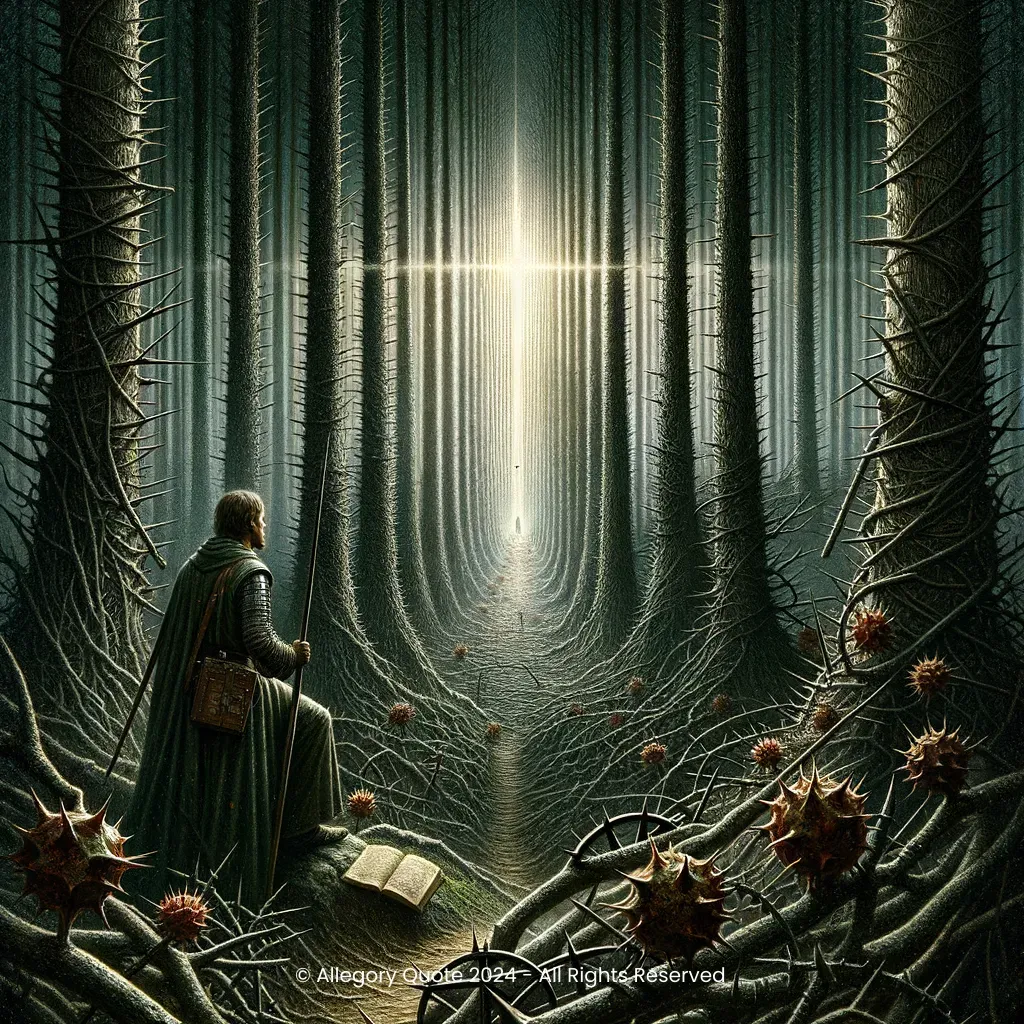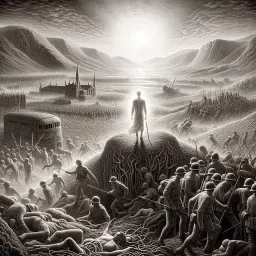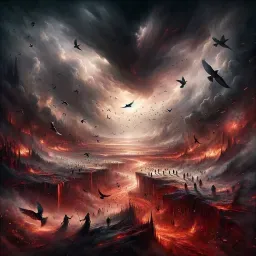”Ah, how hard it is to describe this rough and harsh and dense forest,
which renews fear in my thoughts!“

- Meaning
- The phrase's meaning is deep and layered. Dante describes entering a "dense, harsh, and wild forest," a metaphor for the difficult and obstacle-ridden (spiritual, moral, and psychological) path that one must face in life. The "fear" renewed in thought represents human fear in the face of the unknown and evil. The term "forest" symbolizes a state of spiritual confusion and disorientation from which Dante will begin his journey of purification and redemption.
- Allegory
- The dense and dark forest represents the unknown and the fears that we face in life. The path covered with thorns symbolizes the difficulties and obstacles on the path of personal growth. The individual in medieval clothing represents Dante, and by extension, any person undergoing their inner journey. The ray of light penetrating through the branches symbolizes hope and the possibility of finding a way out and redemption through knowledge and introspection. The open book and the compass respectively represent the search for knowledge and the need for direction in the journey of life.
- Applicability
- This phrase reflects universal experiences, such as feeling lost or confused during tough times in life. It can be applied when facing challenges that seem insurmountable and reminds us that recognizing and confronting our fears is the first step toward personal growth and transformation. It is an invitation not to give up but to embark on a journey of self-knowledge that can lead us out of the "dark forest."
- Impact
- The "Divine Comedy" has had an immense impact on world culture and literature. It has inspired countless artists, writers, and philosophers and represents a masterpiece of allegorical literature. It significantly contributed to the development of the Italian language. The phrases and concepts from the "Divine Comedy," such as Dante's journey through Hell, are frequently cited and used to express metaphors about universal human experiences.
- Historical Context
- The phrase was written at the beginning of the 14th century, between 1308 and 1321, the period during which Dante composed the "Divine Comedy." The work reflects the historical and cultural context of medieval Europe, characterized by profound social, political, and spiritual changes. Dante himself was exiled from Florence, and his personal experience deeply influenced the content of the work.
- Criticisms
- Some critiques of the "Divine Comedy" concern the interpretation of its theological and political contents. The work can be seen as a product of medieval mentality, with all its social and moral structures, which might seem anachronistic today. Some modern critics discuss the fairness of the punishments of the damned and the rigidity of Dante's moral vision.
- Variations
- There are modern and cultural variations of the theme of exile and spiritual confusion. Many religious and philosophical texts from different cultures address the concept of the "dark forest" as a path of purification. For example, the Bible speaks of a "spiritual desert," while Eastern philosophies discuss the "cycle of suffering" that leads to enlightenment. Every culture has its interpretations of these inner journeys that reflect the common human condition of facing trials and growing from them.
-

In the midst of chaos, there is also opportunity.
-

And just as someone who, with laboring breath, has escaped the sea to reach the shore, turns back to gaze at the perilous waters.
-

We are our choices.
-

Your will is free, upright, and whole; henceforth, you act according to its discretion. Therefore, I crown and mitre you over yourself.
-

O imagination, that sometimes steals us so, from outside things, that we pay no attention, though someone might be present who hears a bell or a horn, within you!
-

Love, which absolves no loved one from loving, seized me so strongly with his charm that, as you see, it does not leave me even now.
-

And as the starlings are borne on their wings, in the cold season, in a broad and full troop, so does that blast bear the evil spirits along.
-

Infinite goodness has such wide arms, that it embraces all that turns to it.
-

And I: 'Master, what is so heavy that it makes them lament so strongly?'.
-

To run upon better waters now hoists sail the little vessel of my genius, leaving behind itself a sea so cruel.
-

He had already reached the place where the roar of water falling into the next circle could be heard, similar to the buzzing of beehives.
-

Abandon all hope, ye who enter here.
No Comments